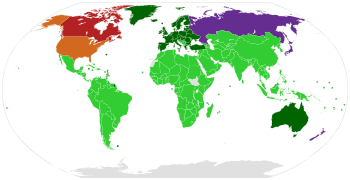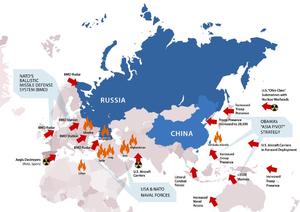The Long View 2002-02-11: The American Prerogative

This is another short one. I'll copy the whole thing here again, because it illustrates some interesting points in John's thinking, and some interesting developments in the last decade.

Kyoto HoaxThe Kyoto Protocols were an unenforceable hoax, and it is good someone finally said so. By way of reminder, look at this image from Wikipedia. Most of the world, and most of the worst polluters, had no actual obligations under the treaty, only the West minus the US and Canada had targets to meet [marked in dark green].
The Durban Conference was not a hoax, but rather more like a protection racket raised to an international level. There really is no upside in humoring ideas like this, although I find the argument comparing Israel with South Africa more compelling than I used to.
Twelve years ago, when John wrote this, I was not Catholic. Since converting, I have noticed that more political support in America for Israel comes from Evangelical Christians than Jews. Catholics are noticeably cooler than other American Christians, partly for domestic political reasons, but also because of the less than polite treatment Arab Catholics have received in Israel.
Zionism is not apartheid, although I can see why you might think so. John Kerry didn't actually say this recently, what he actually said was:
A unitary state winds up either being an apartheid state with second-class citizens — or it ends up being a state that destroys the capacity of Israel to be a Jewish state.
While whites were able to dominate the governments of both Rhodesia and South Africa for extended periods of time, in the democratic twentieth and twenty-first centuries, you cannot long remain in power without some sort of popular will supporting you. The white population of South Africa decreased from 20% in 1960 [stable since 1904] to less than 10% 2011. Rhodesia had a peak white population of about 200,000, give or take, but between 1960 and 1978 the black population had doubled from 3 million to 6 million. Demography contributed as much to the downfall of each government as boycotts and other political events did. Israel plays it pretty smart, and I think the Israelis have avoided the fate of South Africa and Rhodesia by not becoming a minority in their own state. Jews went from a minority to a majority in Israel between 1946 and 1948, by displacing between 700,000 and 800,000 Arab Palestinians. Without doing that, Israel would likely have faced the same demographic doom that overwhelmed the intransigence of the white settlers of Africa. If you pay attention, you can see the Israelis are doing their best to keep their country majority Jewish.
The Anti-Ballistic Missile Treaty was a Cold War coup for the Soviets, who managed to build a functional missile defense system before signing a treaty with the US. Abrogating this treaty was an important step in moving beyond the Cold War, although at this point it is hard not to see how we are kicking Russia when they are down.

Encircling the Bear
However, the point of all this for John was that the international system was actually functioning well. John was a fan of the international system. He pointed out that international bodies that do what they are supposed to do rarely make the news, for example the Universal Postal Union. The world's international institutions often do good and necessary work, they also function as an amorphous and unelected legislature of the world.
America functions as the equally unelected executive, in addition to being the security utility of the world. This restores some balance to the system, as John noted. Eventually, things will even out, and the system will seem more rational. However, we are in for interesting times until that happens.
The American Prerogative
The World Economic Forum ended its meeting in New York City last Monday. The organizers changed the venue from Davos to Manhattan after 911 to show support for the injured city. The hotel and restaurant industries were indeed glad of the business, but the Forum will probably regret the one-time relocation. When the conference was held in an isolated Swiss fastness, it was easy to imagine the event as Night on Bald Mountain with cell phones. Now everyone knows it's the Academy Awards, but without the intellectual seriousness. No good deed goes unpunished.
Nonetheless, the conference was roused from its fashionable slumber as the full implications of last week's State of the Union Speech sank in. Naturally, most critical comment was about the apparent willingness of the US to conduct open warfare without reference to the UN or NATO. More generally, speakers suggested that the Administration was returning to the policy of unilateralism with which it began.
Since the Bush Administration came to office, three of its acts have been most frequently cited as evidence of unilateral arrogance. These are: (1) the repudiation of the Kyoto Protocols on Global Warming; (2) the refusal to attend last summer's Third United Nation's Conference on Racism held at Durban, South Africa; and (3) the withdrawal from the Antiballistic Missile Treaty. Let me very briefly address these three questions individually and then tie them all together.
(1) The Kyoto Protocols were an unenforceable hoax that no major country could ever have implemented. President Bush said this in public when he visited Europe last year. The leaders of the European Union were deeply offended by the charge of hypocrisy, and the protocols were quickly renegotiated to make them easier to enact. They are still a hoax.
(2) Most of the poverty in the world is caused by looters in office, people who look on government as a license to prey on sources of wealth. The agenda of the Durban Conference was to take this practice international by establishing the principle of reparations for the African slave trade. Additionally, the conference equated Zionism with apartheid. There is no upside to humoring ideas like this.
(3) Defenses against ballistic missiles are necessary if decisive conventional force is to be used against hostile regimes that possess strategic nuclear weapons. Deterrence is irrelevant when the Rangers are rappelling into the Presidential Palace. It is true that strategic defenses do not stop terrorist attacks. They do make countries that harbor or support terrorists subject to retribution.
The merits and demerits of these ideas can, of course, be debated. There is substantial international sentiment to the effect the US should have done just that, in the forums provided by the international system, rather than acting unilaterally. However, this criticism misconstrues the situation.
The merits and demerits of these ideas can, of course, be debated. There is substantial international sentiment to the effect the US should have done just that, in the forums provided by the international system, rather than acting unilaterally. However, this criticism misconstrues the situation.
When the president of the United States refuses to promote something like the Kyoto Protocols, he is not seceding from the international system. Quite the opposite: he is, in effect, acting as the executive of the system by vetoing a proposal from the tangle of institutions that act as its legislature. As with the presidential veto domestically, such acts are not final, and the power involved is essentially the power to stop things. This is true even of the withdrawal from the ABM Treaty; in a world with an increasing number of small nuclear powers, the old Cold War agreement had come to mean something new. This veto authority is a real, organic development of the international system, far more important than the commissions and special tribunals organized by international activists.
This American prerogative really is terribly uppity. It would be insupportable, if it were in derogation of democratic institutions, or even of the rule of law. Those features are, however, precisely the features that the "international legislature" lacks. The world's international institutions often do good and necessary work, but they are appointed bodies of experts. The pretenders to democracy in the international system are the non-governmental organizations. These are run by self-designated persons who turned to the international arena because they could not get their agendas accepted domestically.
As for international law, it has been fatally undermined by international legal experts. Historically, customary international law was a description of how governments actually behaved. Now, increasingly, it means norms devised by international jurists on the basis of nothing more than their own ideology. Some of these norms are good and some are bad. None of them, however, deserves special deference from a responsible elected official.
The current situation is unstable because existing international institutions lack legitimacy, and sometimes even a name. (As the astrophysicists say, no fact will be accepted until we have a theory to confirm it.) Still, it is not hard to see how things will evolve. Extensive democratization of the international system is probably impractical. However, its predictability will increase when the legislature becomes less irresponsible. The American Prerogative is essential to making that happen.
Comments ()